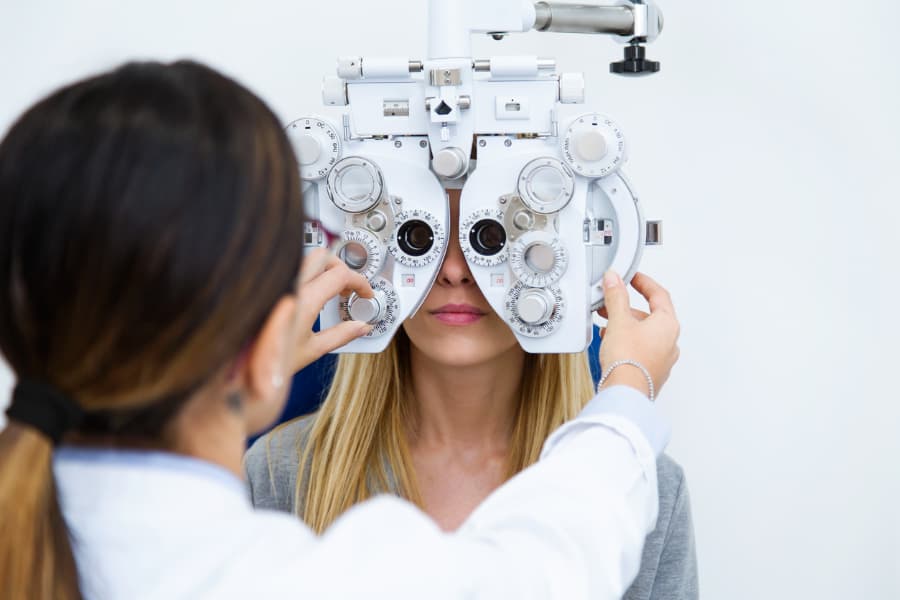 If you enjoy working with people and have a passion for eye health, a career as an ophthalmic medical assistant could be for you. Ophthalmology is a medical field that focuses on treating and managing disorders of the eye. Just like other fields in healthcare, medical assistants are needed in optometrist’s and ophthalmologist’s offices across the country.
If you enjoy working with people and have a passion for eye health, a career as an ophthalmic medical assistant could be for you. Ophthalmology is a medical field that focuses on treating and managing disorders of the eye. Just like other fields in healthcare, medical assistants are needed in optometrist’s and ophthalmologist’s offices across the country.
Prism Career Institute, located in Pennsylvania and New Jersey, offers a medical assistant program that gives students the foundation to become an ophthalmic medical assistant. Here, Prism Career Institute talks about how an ophthalmic medical assistant can make more money than other medical assistants.
What Do Ophthalmic Medical Assistants Do?
An ophthalmic medical assistant works in an ophthalmology or optometry office. An ophthalmic medical assistant’s main task is to help care for the vision and eye health of their patients. Some ophthalmic medical assistant responsibilities include:
- Checking patients’ vision: Ophthalmic medical assistants may help with an eye exam, including using a Snellen chart to measure visual acuity.
- Filling out paperwork: Ophthalmic medical assistants may need to fill out forms, such as DMV or disability forms, to help patients get the care they need. In addition, they may help patients with questionnaires and intake forms.
- Maintaining equipment: A typical ophthalmology office will have a variety of complex and expensive instruments, such as slit lamps, phoropters, autorefractors, and more. Ophthalmic medical assistants help maintain equipment and ensure that everything works properly.
- Making and answering phone calls: Ophthalmic medical assistants are usually in charge of communicating with patients over the phone. They can answer questions, give directions, and remind patients about their appointments. In addition, they can help triage patient complaints.
- Ensuring supplies are well-stocked: A healthcare facility needs adequate supplies to operate effectively. Ophthalmic medical assistants must be familiar with the kinds of supplies and know how to order them.
- Performing pre-testing: Ophthalmic medical assistants usually perform pre-testing on patients, including checking eye pressure, using an autorefractor to estimate a patient’s prescription, and running visual field screening tests.
- Scheduling appointments: This includes booking, rescheduling, and canceling appointments.
- Taking patient case history: Gathering information about patient case history is important for most visits. Ophthalmic medical assistants will ask the patient about several things, like their last eye exam, their medical history, and the medications they currently take.
- Using lensometers: This instrument checks the prescription of glasses.
Although these are the common duties of an ophthalmic medical assistant, responsibilities can change daily. Overall, these healthcare professionals play a key role in helping medical offices run smoothly.
Medical Assisting Program Offered at Prism Career Institute
The medical assistant program at Prism Career Institute takes about 40 weeks to complete and consists of 420 lecture hours, 150 lab hours, and 150 externship hours. Students will take courses that cover clinical and administrative tasks. Specific topics the program covers include:
- Anatomy and physiology
- Clinical procedures
- Electrocardiography (EKG)
- Medical law and ethics
- Patient history/vital signs/CPR
- Patient hygiene/infection control
- Pharmacology
- Phlebotomy
- Professional communication
- Records management
To learn more about the coursework for the medical assistant program, check out Prism Career Institute’s course catalog. A description of each course is included, along with program requirements.
These courses provide a knowledge base to prepare students for various medical assisting positions. Those who want to specialize in ophthalmic medical assisting may require more training. At the same time, because of the additional training, ophthalmic medical assistants may earn more than their general medical assisting counterparts. What’s more, upon completion of the courses and externship portion, students can take the Certified Clinical Medical Assistant (CCMA) exam.
Begin Your Career in Healthcare at Prism Career Institute
The medical assistant program is offered at all three of Prism Career Institute’s campuses, including Philadelphia, PA, Cherry Hill, NJ, and West Atlantic City, NJ. Daytime and evening classes are available in New Jersey for these programs, which allows students to choose the path that is more convenient for them.
At Prism Career Institute, students gain knowledge through classroom learning, laboratory sessions, and hands-on training in a school environment. We also provide externships and clinical training for practical work experience in local healthcare settings. This helps students gain a competitive edge when it comes time to enter the working world. For those who need help paying for their training, Prism Career Institute offers financial aid to those who qualify.
Take the first step toward your career as an ophthalmic medical assistant by developing the skills you need. Contact us to learn more about the medical assistant training program at Prism Career Institute or apply today.
